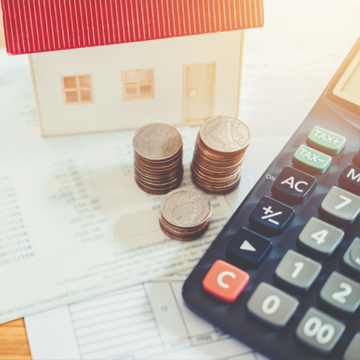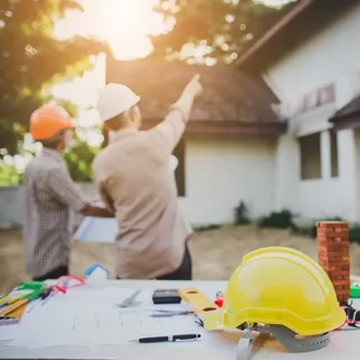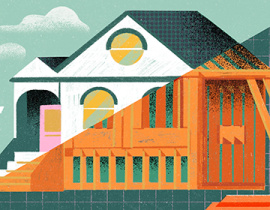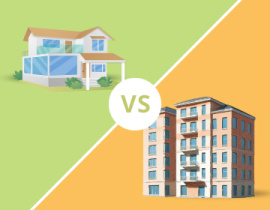- Home
- Blog
- Tips & Advice
- How to Decide Which Property is the Best One?
How to Decide Which Property is the Best One?
Buying a home is one of the most significant financial decisions you’ll ever make, and it’s important to be well-prepared. Whether you're a first-time buyer or a seasoned investor, understanding key factors like location, cost of living, and real estate market trends can help you decide which property is the best fit for your needs and budget. Here are some tips on how to compare properties, analyze the property market, and navigate the complexities of real estate to ensure you make the right decision.
Location: The Key to Finding the Best Places to Buy a Home
 When it comes to buying real estate, location is important. The best places to buy a home are often those with a balance of affordability, accessibility, and growth potential. Start by researching different neighborhoods and considering factors such as proximity to schools, work, public transportation, shopping, and recreational areas.
When it comes to buying real estate, location is important. The best places to buy a home are often those with a balance of affordability, accessibility, and growth potential. Start by researching different neighborhoods and considering factors such as proximity to schools, work, public transportation, shopping, and recreational areas.
What is the neighborhood like?
The neighborhood can significantly affect your lifestyle and your home's future resale value. Consider factors like safety, amenities, schools, parks, public transport, and local growth potential. Visit the area at different times of day and week to get a feel for the surroundings. You can also talk to neighbors and check online resources like crime reports and school ratings.
If you're looking for an investment property, consider areas with strong rental demand. These regions tend to have high long-term growth potential, making them ideal for real estate investment tips. You can also learn more about how to find the most affordable places to buy a home here.
Property Market Analysis: Understanding Real Estate Trends
Before making a decision, it’s essential to conduct a thorough property market analysis. Real estate market trends give you an overview of current conditions in various areas. This analysis can help you identify whether property prices are rising or falling and predict future appreciation. Stay informed about:
- Housing inventory levels
- Price trends in the area
- Demand for rental properties
How much do homes sell for in the area?
Understanding the going rate for homes in the area will give you a benchmark for fair pricing. This helps you to know if a property is overpriced, underpriced, or right in line with current market trends. Research recent home sales in the neighborhood, and look at comparable properties to see what similar homes have sold for. Your real estate agent can also provide insights into local pricing trends.
How long has the property been on the market?
If a property has been on the market for an extended period, it might indicate that the home is overpriced or has some issues. On the other hand, new listings might offer an opportunity to act quickly before prices rise. Check the listing history to find out how long the home has been available and whether the price has been reduced.
By understanding the property market, you'll be in a better position to make an informed decision about when and where to buy. You can also look into the most popular and profitable areas to buy real estate in our detailed guide on building wealth through real estate.
The Cost of Living: Assessing Affordability
When deciding on a location, it’s crucial to take the cost of living into account. While a particular area might have attractive properties, the overall cost of living could affect your decision. From utility bills to transportation and groceries, these factors can add up quickly. Always compare the cost of living in different neighborhoods to ensure you're making a financially sound choice.
 What are the property taxes and insurance costs?
What are the property taxes and insurance costs?
Property taxes and insurance can significantly impact your monthly costs and overall budget. Ask the seller or your real estate agent for details about the property’s tax history and current insurance premiums. Use this information to calculate your overall affordability.
How to Compare Properties: Key Considerations
Comparing properties goes beyond just looking at square footage and number of rooms. To make an informed decision, consider these essential factors:
- Condition of the property: What repairs or updates are needed?
- Property size: Does it meet your long-term space requirements?
- Included features: Are appliances or fixtures included in the sale?
- Price: Compare similar properties in the area to ensure you're getting a fair deal.
Is the property size adequate for my needs?
Ensure the property meets your long-term space requirements, whether it’s for a growing family, your lifestyle, or even potential expansion. Consider both the number of rooms and the overall square footage. Take note of the number of bedrooms, bathrooms, and overall layout. Think about your daily needs and whether there’s enough storage, parking space, or room to grow.
Also, be sure to consider the location and its potential for appreciation. Properties in highly sought-after areas or those with planned infrastructure improvements are often worth a little extra.
New Construction vs. Existing Homes: What’s the Best Choice?
 One of the biggest decisions you’ll make when buying property abroad is whether to opt for new construction or an existing property. Each option has its pros and cons:
One of the biggest decisions you’ll make when buying property abroad is whether to opt for new construction or an existing property. Each option has its pros and cons:
- New construction: These homes are often more energy-efficient and customizable. However, they might come at a premium price and could require additional wait time.
- Existing homes: While they might be priced lower, they can come with hidden repair costs and outdated features. However, an existing home in a desirable neighborhood could appreciate faster, offering long-term benefits.
Does this property fit into my long-term strategy?
If you're purchasing an investment property, make sure it aligns with your long-term goals, whether it's generating rental income or appreciation. For personal homes, ensure it supports your future plans, like family growth or career moves.
Ultimately, it comes down to your preferences, budget, and the potential for future growth in the area.
Steps to Buying a House: A Simple Guide
The process of buying a home can be complex, but breaking it down into simple steps makes it easier:
- Determine your budget: Know how much you can afford by assessing your savings and getting pre-approved for a mortgage.
- Research locations: Explore the best neighborhoods to buy property based on factors like safety, schools, and amenities.
- Compare properties: Use online tools and work with a real estate agent to view multiple homes within your budget.
- Get a property inspection: Always inspect the property to uncover potential issues.
- Make an offer: Once you’ve chosen a property, make an offer and negotiate with the seller.
- Close the deal: Complete the necessary paperwork and finalize the purchase.
Real Estate Investment Tips: How to Buy Investment Properties for Sale
If you’re looking to buy investment properties for sale, it’s important to do your due diligence. The best investment properties often require careful consideration of rental yields, property conditions, and future growth potential. Learn more about the top factors that make a great real estate investment in our blog on luxury real estate investment wins.
 Consider these real estate investment tips:
Consider these real estate investment tips:
- Research rental demand: Look for areas with strong rental markets, such as near universities or business districts.
- Evaluate property condition: An investment property with deferred maintenance can be renovated to increase value, but make sure you have the budget and time to invest in improvements.
- Consider long-term growth: Look for areas that are likely to experience infrastructure improvements or economic development, as these can lead to increased property values.
Finding the best property requires a careful balance of personal needs and investment potential. Whether you’re searching for a family home or an investment opportunity, understanding the real estate market trends, the best neighborhoods to buy property in, and the steps to buy a house will guide you in the right direction.
Remember to always ask key questions like "What’s my total budget?" or "What condition is the property in?" throughout your search. By carefully comparing properties, assessing affordability, and considering long-term goals, you’ll be able to make the best decision.
With the right tools, strategies, and professional advice, you can make a smart investment and find the home that’s perfect for you.










